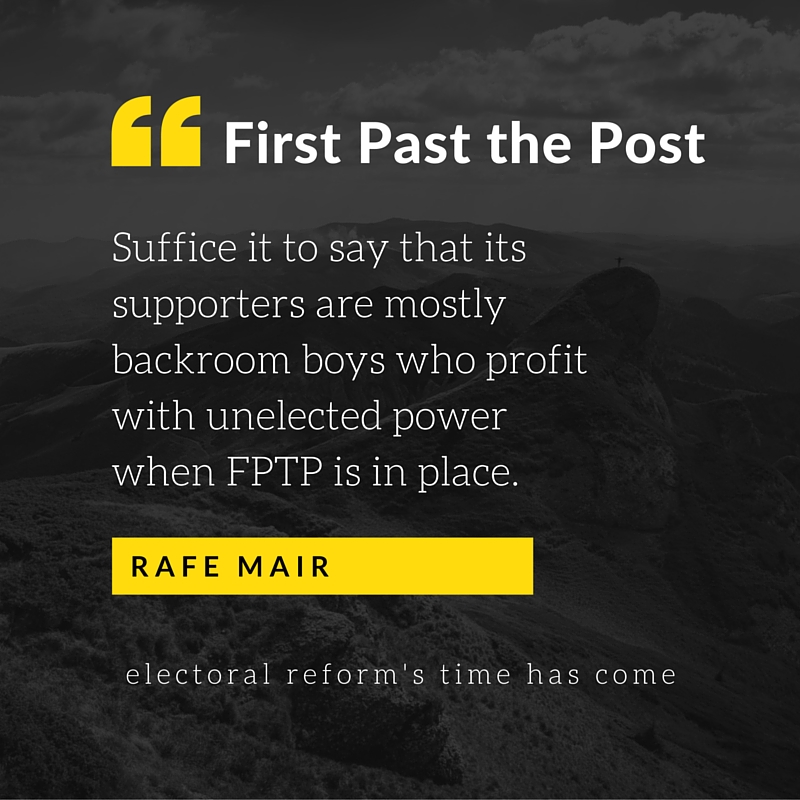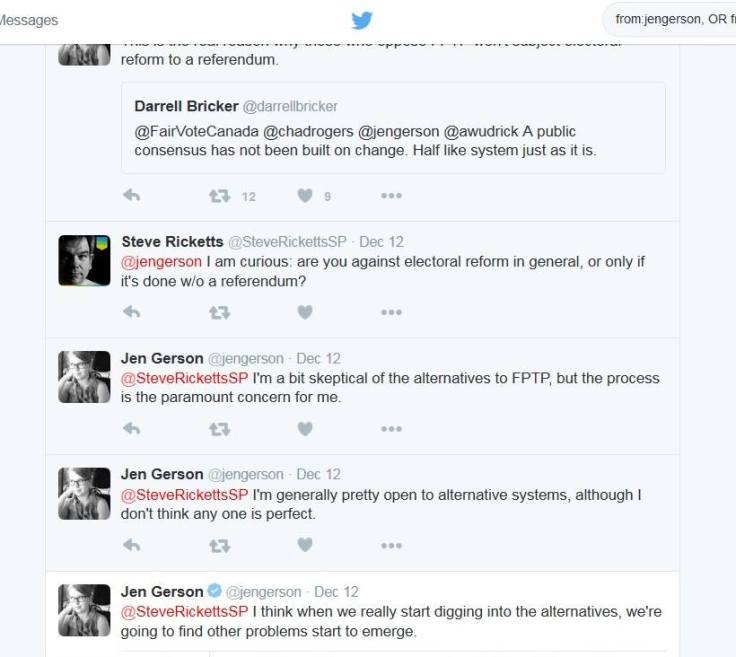 Without a democratic test, electoral reform will become a political ping-pong for a generation
Without a democratic test, electoral reform will become a political ping-pong for a generation
Source: Jen Gerson: The case for a referendum | National Post
National Post writer Jen Gerson suggests, despite tweets demonstrating that she is far from fully informed on the subject of electoral reform, that intent to distance Canada from the winner-take-all system that has consistently gifted Canadians with false majorities, will somehow gift an entire generation with a system of political ping-pong.
“Electoral reform will become a political ping-pong for a generation.”
The line sounds good, but what does this even mean?
In her tweets Gerson acknowledges that she has yet to ‘dig into’ the alternatives to our First-Past-the-Post (FPTP), yet she feels quite comfortable refusing to acknowledge, support or engage with the government’s proposed Electoral Reform consultation process. Instead she shouts that referendum is the only way to make sure Canadians will receive a democratic outcome.
I think when we really start digging into the alternatives, we’re going to find other problems start to emerge. Jen Gerson @jengerson
If ‘we’ haven’t started digging into the alternatives, how can we consider a referendum, and have ‘we’ bothered to explore possible problems with referendums before shouting out how they are the only democratic way?
Ms. Gerson’s “The case for a referendum” appeared in the National Post’s Full Comments section on December 18, 2015. The piece is typical of the substance and fact starved type of story National Post thrives on (oops my bias is showing). The thing is, Ms. Gerson is a very good writer, but clearly, sometimes writing the kind of stories that easily put food on the table takes precedence over genuine factual and unbiased investigative journalism. Journalists have it tough these days, and I can appreciate the need to make a living. Nevertheless, I did voice my displeasure with Gerson’s take on electoral reform in the comment section, and am reposting my thoughts here on Common Canadians. Give the article a read, and then come back and see (just some) of what was down right wrong about the piece.
‘The Case for a Referendum’: Attempts to inflame. Failure to Inform.
Where to begin on where this article is inflaming and how it fails to inform? By traditional journalistic standards it is a waste of space. Let’s start with ‘inform’. The largely hygienically responsible Canadian ‘masses’ have a right to be fully informed, and have a responsibility to the due diligence necessary to understanding an issue as important as Electoral Reform.
Wooing readers by an inflammatory, metaphor riddled attack-the gov’t rhetoric piece — one with weak premises — does a real disservice to Canadians and to journalism itself. The reader has been offered no facts unpainted with bias when pure facts would have turned this into a worthwhile information source.
According to Ms. Gerson, we’ve been governed by this FPTP system “since before Germany was a country” and our FPTP ‘roots’ were “bequeathed to us as a nascent colonial nation”. Dates would have been sufficient Ms. Gerson. It would have allowed space to include at least one important fact — no one asked the citizens of the ’nascent colonial nation’ what kind of voting system they wanted. There was no referendum, or anything resembling a referendum, conducted. Electoral Reform, and specifically changing the FPTP model has been under discussion in Canada, off and on, since at least 1921. Perhaps the article could have touched on the actual history of our current system in context of overall public, and governing body, satisfaction through the years. By doing so, some small light would have been shed on why referendum (by way of existing methods), at this exact time, might not be the best way to go about defining and implementing electoral reform.
When it comes to the writer’s comments about a referendum, campaign promises, and mandates — well — again we see information touched on, but heavily cloaked in misleading if not pure misinformation. For those Canadians who did not closely follow the election, misleading information and outright misinformation probably amount to the same thing. Simply put, 3 out of 4 parties placed Electoral Reform prominently in their publicly published platforms. I intentionally do not include the PQ, because as I recall, but have not verified, as of this writing, that: The PQ was publicly for electoral reform, but did not physically include it in their platform. I will edit this section once I have verified the facts.
I did watch the election closely, and the media couldn’t step away from wedge issues, like the Niqab, long enough to bring the issue forward. The only party that did not espouse the elimination of FPTP did not address the issue in any way during the campaign. The public did want to engage with the subject. Town halls and debates about electoral reform were hosted and publicly attended. In public debates, and in other engagements and media, 3 out of 4 (if not 5) parties engaged with the public on this issue. The party that is waving the FPTP torch was consistently unavailable for engagement with the public on electoral reform. How the dissenting party engaged with their own voter base on the subject is not something the general public is privy to, and therefore cannot be debated in a general, or point-by-point, manner. Yet another disservice to our hygiene aware masses.
Admittedly, the overall mandate is blurred. The argument for how false majority platforms morph into mandates is a primary argument for implementing electoral reform before 2019. If there is any other way to eliminate the ubiquitous mandate waving and counter ‘false majority campaign platform’ rhetoric, I don’t know it. Again, good journalism would explore the problem in a detailed and comprehensive manner.
We DO have another false majority. Over 60% percent of voters among 2015’s higher than normal turnout were clearly not averse to electoral reform. Speculation of what percentage of those voters favoured MMP specifically, and how many simply accepted the wisdom of distancing Canadians from the FPTP system — a system that has us all locked in costly pendulum swings between two opposing ideologies enjoying false majority control of government — is at this juncture, pointless.
The writer asks, “how exactly can we grant the Liberals carte blanche to overhaul a system rooted in long-standing tradition based on his apparently fake majority?” The answer is simple. Embrace public consultation as committed to by the Liberal Gov’t. The government is at least actively seeking widespread and non-partisan consensus amongst the public, gov’t, and non-governmental organizations and agencies. In his comments to the public during the year-end MacLean’s Town Hall on Dec. 16th, the PM neither dismissed, nor embraced, referendum. Nevertheless, his commitment to an unbiased public consultation before considering a possible referendum was emphasized. The need for, or lack of need for, a referendum will undoubtedly present itself in an organic manner through the committee/consultation process.
Comments by the writer also brought up Venn Diagrams and F-35s. With all due respect, the effects of ’mundane’ concern influencers such as the TPP, a pact drafted in utter secrecy by a government that presented no clearly related platform — and clearly won no mandate to negotiate such a broad-spectrum agreement — are permanent. TPP will profoundly affect the day-to-day lives of all Canadians. TPP has no expiry date and was presented to Canadians as a fait accompli in the middle of an election. The Venn Diagram argument is actually an excellent argument for getting rid of FPTP. My example of the TPP suggests we just may have waited too long.
The referendum demand at this time, is premature, distracting and serves select interests only. I would frankly suggest, that calls for referendum based on democracy and clear mandates should be approached by the government opposition with caution.
And finally, to the writer’s asserted, “Short of a fairly conducted referendum, there is simply no way the 60 per cent of Canadians who did not vote for the governing party will be able to trust that any changes to the electoral system aren’t cynical alterations intended to edge every other party out of power indefinitely.” In the absence of an in-play consultation process to be analyzed, this is nothing short of fear mongering.
Journalists and all media publishers should be doing their part “to invest in a massive outreach and education campaign, impartially delivered, to ensure every voter understands why this change is being proposed and what the potential alternatives might be.” Once we’ve collectively engaged with the subject sufficiently, we can consider whether or not “nothing short of a referendum will assure the populace it has been consulted, and that the changes are to be fairly implemented.”
I have no objections to our government’s feet being held to the fire by citizens and media. I applaud it when it is done in a truly responsible manner. Fear mongering, premature distractions to sway the uninformed towards a specific camp, and chasing engagement by emotionally inflaming readers, were once the realm of yellow journalism. A concept aberrant and abhorrent to most journalists and publishers. Articles, or even a series of articles, that genuinely inform the reading public on the subject of electoral reform, coupled with proactive coverage of how the non-partisan consultation process unfolds, is what is needed. Is Ms. Gerson and the NP up to the challenge?


Leave a comment